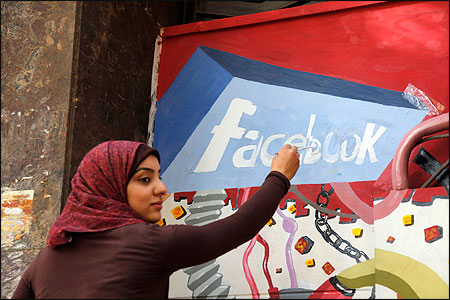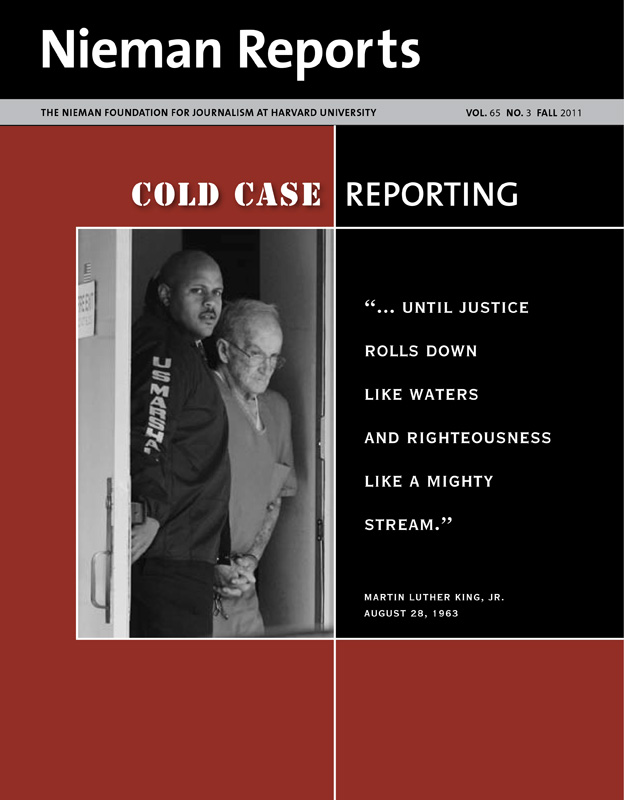 The Facebook logo became an icon of the revolution that overthrew Egypt’s President Hosni Mubarak. Photo by Manoocher Deghati/The Associated Press.
The Facebook logo became an icon of the revolution that overthrew Egypt’s President Hosni Mubarak. Photo by Manoocher Deghati/The Associated Press.
In the wake of the Arab Spring, a vigorous debate is taking shape. While Facebook and Twitter are recognized broadly for playing a pivotal role in broadcasting information from inside the demonstrations in Cairo’s Tahrir Square and elsewhere, views differ on the fit they will—or should—have in territory that has been the traditional reserve of journalists.
Throughout the Arab region, Web forums—general and themed—have long served as hosts for civic discussion. These online spaces held the place of social media before global sites like Facebook and Twitter came along. From 2004 to 2007, when I lived in Morocco, Facebook was nascent, still closed off to users outside certain networks, and Twitter, launched in 2006, had not yet emerged there. Blogs were still new, so much so that the Moroccan blogosphere, now a force to be reckoned with, consisted of just a handful of largely disconnected writers posting in diary style, dipping briefly into politics or sports. It was Yabiladi, Bladi and others—Morocco’s forums—that were sources of unreported news, discussion and social commentary.
Morocco is not a dictatorship like Tunisia was before its revolution or as Syria remains today. It is a parliamentary monarchy with democratic norms followed to varying degrees, depending on the issue at hand. Its press is considerably freer than that of its neighbors in the region, with only a few off-limits subjects such as Islam, the king, and the Western Sahara, to name a few.Yet a few journalists there do broach even the most taboo subjects, sometimes to the detriment or demise of their careers.
RELATED ARTICLE
“Morocco and Press Freedom: A Complicated Relationship”
– Ahmed BenchemsiOn the Moroccan Internet, otherwise verboten topics are discussed routinely. Trilingual and multicultural, the country’s blogosphere thrives and expands as Moroccans communicate via Facebook and Twitter. As they do, the topic of conversation changes, leaning more toward the political. Individuals’ blogs fill in perceived gaps in local mainstream reporting while group blogs like Mamfakinch publish information about the ongoing protests sparked by the February 20th movement. Using Twitter and Facebook, people share videos of demonstrations, debate the movement’s relevance, and analyze the mainstream media’s depiction of what’s happening in the streets and in the halls of power.
Social media now hold a vital place in this media ecosystem, filling informational voids left by the still bridled state and traditional media. Words written on them also round off the unknowing edges of reporting done by foreign media who fail at times to understand certain cultural, political or societal dimensions of their stories.
A similar dynamic exists throughout the Arab world—and beyond. In January, a global community followed Egyptians as they live-tweeted their uprising. We remain riveted by the horrific videos coming out of Syria as authorities brutally crack down on protesters and the hopeful ones coming from Saudi Arabia where women record their attempts to drive. In all of these examples, social media were not only effective, but also vital in spreading information.
Media or Journalism?
While there is little question that online commentary adds value to the media landscape, is it journalism or is it activism? Or is it, perhaps, both? The answer, though complex, lies in the existing roles of state, mainstream and alternative media in the region.
Arab state media, in large part, assume the role of propagandist. To those who might challenge this description, I offer an illustrative example: Back in September 2010, just a few months before Egyptians rose up and ousted him, President Hosni Mubarak was the subject of a social media scandal. Al-Ahram, a state-run newspaper, had published a doctored image of the five leaders of the Israeli-Palestinian peace process. In it Mubarak was leading the pack, instead of U.S. President Barack Obama, as was actually the case. But alas, readers caught on quickly and used digital media to debunk Al-Ahram’s image and spoof the scandal.
The region’s independent news organizations must also be careful of firm lines drawn in shifting sands. Reporters and editors know to avoid certain topics or stick to safe talking points—stopping short of regurgitating propaganda—lest they find themselves without a job, or worse. And Western news entities with Arabic editions, such as CNN or the U.S. government-funded Alhurra, are seen as harboring a pro-American political agenda.
All of this leaves a large gap to be filled, often by small independent outfits relying to some extent on user-generated content. Working against the backdrop of the flagrantly biased state media and international media that, at best, have their own agendas, this emerging band of online writers strives to provide a corrective, alternative view that is inherently impartial, in the vein of public interest media.
Today’s Arab media landscape is polarized, lacking either the tradition of or interest in the American concept of objective reporting.As media scholar Adel Iskandar observed in 2008, “Government media and alternative agendas alike pose an inherent problem for advocates of objectivity.” Citizen-generated content adds a new dimension with its range of perspectives. But just as they can serve to challenge the mainstream forces, they can be tools of government propaganda, as seen most recently in Bahrain and Syria, where masses of Twitter and Facebook users have attempted to uphold state views by flooding services with pro-regime sentiment.
Though these pro-state users present a worrying development, the overall trend is toward a diversity of views. As George Washington University professor and Middle East blogger Marc Lynch observed in 2007, the Arab blogosphere is “chipping away at the encrusted structures of the Arab punditocracy.” Social networking sites serve a similar purpose while encouraging quick updates and communication. While blogging allows for reactive punditry, Twitter and Facebook allow for rapid-fire commentary. Their use during major events is often immediately corrective, providing context or amending errors in mainstream journalism.
In reporting on the Egyptian uprising, for example, various U.S. media outlets repeatedly credited Facebook, Twitter, WikiLeaks and even nonviolence strategist Gene Sharp for the revolution. Through social media, Egyptians challenged these reports, such as when Twitter users mocked The New York Times with the hashtag #GeneSharpTaughtMe.
Blogs and social networking sites—and the Arabic Internet itself—are what Iskandar called in 2007 the “only regional venue for consistently non-hierarchical, socially-concerned, counter-hegemonic information, thereby making it the region’s most appropriate ‘alternative medium.’ ”
This active participation in journalism, made possible by social networking sites, is therefore changing the region’s journalistic landscape and allowing for commentary not possible in even the most alternative of venues. As Internet access rates continue to grow and social media continues to be adopted as a venue for free expression, we will continue to see this landscape shift and expand, becoming more participatory and in turn more democratized.
Will there be journalists and news organizations? Certainly, and the roles they play will likely be significant ones in strengthening democratic impulses. But right alongside will be the social media entrepreneurs and enlivened citizenry, pushing and prodding, as has been their role so far in these seasons of Arab revolution.
Jillian C. York is the director for international freedom of expression at the Electronic Frontier Foundation and the cofounder of Talk Morocco.


